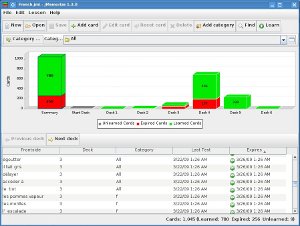Focus On: jMemorize
by Stephen Fluin 2009.03.23 I am a really big fan of personal development. One of the shifts in human culture that has been happening over the past few years in regard to personal development is a shift from knowledge development to skills development. This general trend is being led by the internet revolution where data is constantly being created, revised, cross-referenced, and improved. Now it doesn't make sense for a human being to spend effort learning a single piece of information, for example, the speed of light. Humans only need the ability to look that piece of information up (3.0x10^8 m/s).
I am a really big fan of personal development. One of the shifts in human culture that has been happening over the past few years in regard to personal development is a shift from knowledge development to skills development. This general trend is being led by the internet revolution where data is constantly being created, revised, cross-referenced, and improved. Now it doesn't make sense for a human being to spend effort learning a single piece of information, for example, the speed of light. Humans only need the ability to look that piece of information up (3.0x10^8 m/s).
There is a point at which skills development is not enough. The most common case for this is languages. I may be able to repeatedly use a translator or the internet to understand a webpage or communicate with another person in another language, but this slow, impractical, and doesn't achieve real communication. There are also several other cases where actual knowledge can be beneficial over skills. A couple examples of this are when attempting to understand a wider topic or idea, or as a way to recognize relevant information more quickly. It may seem silly, but knowing the capitals of each of the countries of Europe provides a solid basis for the understanding and discussion of regional politics and economics.
To support the growth and acquisition of knowledge, there are a lot of techniques out there. My favorite one for the moment is called jMemorize. It is an open source flash card application designed to use The Leitner Principle for learning raw data.
How does jMemorize work?
 jMemorize is special because of the way it allows you to group information based on the difficulty it presents to you. The highest level of organization in jMemorize is the Lesson level. For example, a few of the lessons I use are "French Vocabulary", "Capitals of Europe", and "Cyrillic Alphabet". Within the lesson, there is a set of cards. These cards equate to normal physical flash cards and have a front and a back.
jMemorize is special because of the way it allows you to group information based on the difficulty it presents to you. The highest level of organization in jMemorize is the Lesson level. For example, a few of the lessons I use are "French Vocabulary", "Capitals of Europe", and "Cyrillic Alphabet". Within the lesson, there is a set of cards. These cards equate to normal physical flash cards and have a front and a back.
jMemorize takes you through learning sessions by presenting you a series of cards, one at a time, and asks you if you knew the information on the opposite side of the card. If you got it right, the card will move up one deck, meaning that you understand or recognize the information on the card better than you did before, so the program won't ask you again for a little while. Depending on your settings, one example would be that after you have recognized a card 5 times, you won't be see that card for 16 days. If you got the card wrong, it will return to the "unlearned" deck, and it will be asked the next time you start a learning session.
My Personal Preferences
I want to share my personal preferences about how to best utilize the program, although everyone learns differently so you should play with the settings to achieve the setup you want.
- Use Exponential scheduling - In the learn settings, and the "Scheduling" tab, I choose the Exponential preset because I find it best matches the speed with which I need to review new information.
- Two learning types - I use two different learning types depending on the type of information I am learning.
- In cases where I already understand a lot of the information, such as French Vocabulary, I choose to use a time limit, and I choose not to retest cards that have been failed. I have found that this is the best way to accurately categorize and familiarize myself with large data sets.
- In cases where I am totally unfamiliar with the information, or even how to categorize the information in my brain, I choose to use a card limit, such as 10 or 15, and I do retest cards that have been failed. Using these options presents me a set of 10-15 cards at a time, and I will see them repeatedly until through recognition or luck, I remember their associated information. An example where I use this technique is with the Cyrillic Alphabet. When I first approached the topic, there were no distinguishing characteristics for me to use to begin the learning process, but by repeatedly working with small sets, I was able to move forward with them.
permalink
